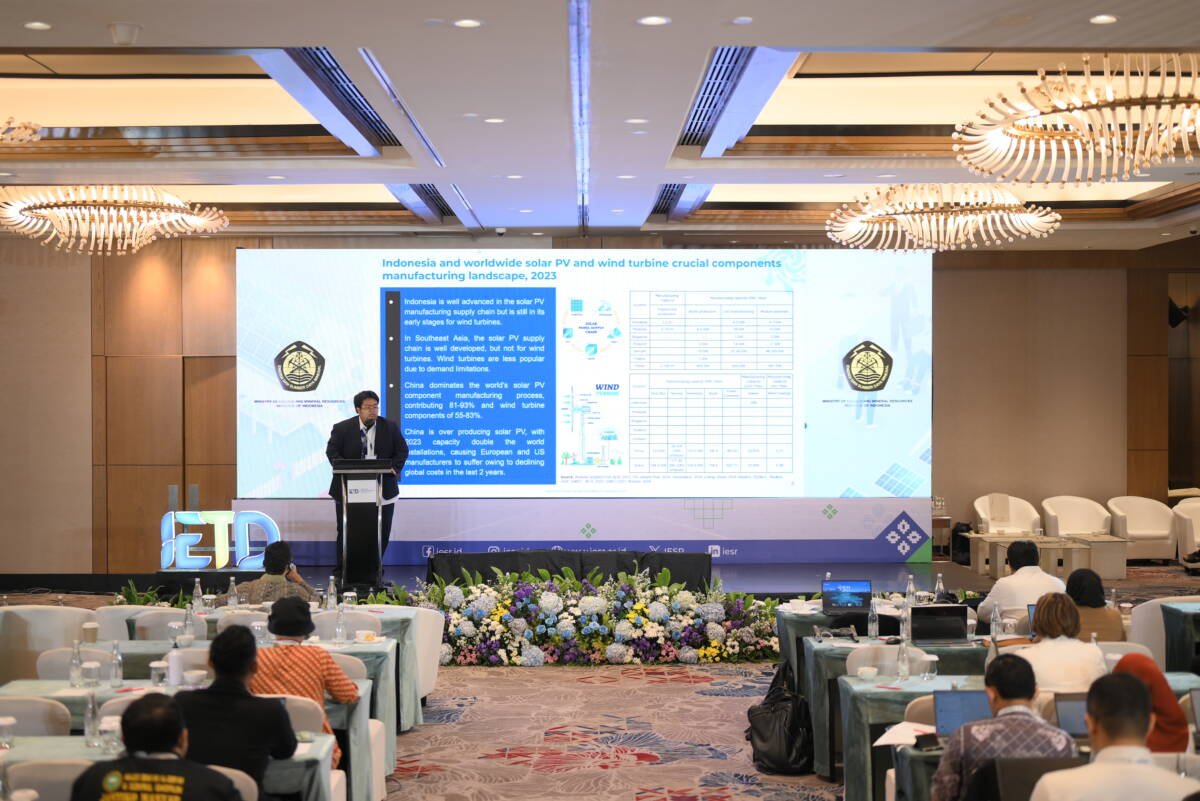Jakarta, November 6, 2024 – The extensive utilization of renewable energy is set to boost the development of the renewable energy manufacturing industry, including fostering a more efficient and cost-effective green hydrogen ecosystem. The Institute for Essential Services Reform (IESR) encourages the government to achieve energy independence, as outlined in Prabowo-Gibran’s Asta Cita, by expanding the renewable energy mix and strengthening the supply chain.
The Coordinator for Services and Supervision of Renewable Energy Businesses at the Ministry of Energy and Mineral Resources, Muhamad Alhaqurahman Isa, stated at the Indonesia Energy Transition Dialogue (IETD) 2024, during the session “Workshop Accelerating Green Hydrogen Economy” (6/11/2024), that the government is currently preparing a hydrogen roadmap, scheduled for release in early 2025.
“This roadmap adopts a demand-driven approach. By 2060, domestic demand for hydrogen is expected to reach 9.2 million tons, with a projected production of up to 17 million tons, part of which will target export needs. The initiation phase between 2025 and 2034 will focus on establishing roadmaps, feasibility studies, FGDs, and designing incentives,” Alhaqurahman noted.
Regarding the development of the renewable energy manufacturing supply chain, IESR highlights Indonesia’s tremendous potential. With an abundant renewable energy capacity of 3,687 GW, Indonesia has more than enough to meet domestic energy demands. However, to tap into this potential, it is essential to build a robust renewable energy manufacturing supply chain, enabling renewable energy to be accessed at competitive and affordable costs, thereby ensuring sustainable energy security. Moreover, renewable energy development is crucial for reducing emissions and supporting clean energy and green hydrogen production. In particular, there is strong market interest in solar and wind power technologies, which can be further developed in Indonesia, supported by the country’s adequate supply of critical minerals.
Farid Wijaya, Senior Renewable Energy and Materials Analyst at IESR, stated that as a first step, the government can leverage Indonesia’s critical mineral resources through the ‘Downstream’ program. This program can support the development of manufacturing industries for solar power plants, wind turbines, and electric vehicle batteries, all of which heavily depend on critical mineral availability. This approach is essential to meet domestic solar and wind energy needs, making the domestic market the primary and priority market.
In the Ministry of Energy and Mineral Resources (MEMR) net zero emission (NZE) roadmap, Indonesia targets 115 GW of solar power capacity by 2060, which will require an estimated investment of around USD 110.6 billion. Indonesia has the opportunity to channel this investment into domestic industries and services, particularly for solar module components, balance of system and power plant components, development costs, and labor, thereby contributing to domestic economic growth. This aligns with the government’s goal of raising economic growth to eight percent. With strong industrial and service readiness, Indonesia could potentially capture around 90 percent of this investment value for the growth of its domestic solar PV market. This estimate is based solely on projected power plant capacity and does not include the additional demand for hydrogen production, which could further increase.
“The supply chain for solar power plants in Indonesia is more developed compared to other renewable energy sectors, such as wind farms and batteries. The downstream mining program, especially for critical minerals, also has the potential to accelerate growth in the renewable energy manufacturing industry, particularly for batteries, solar modules, and wind turbines. This progress can drive faster renewable energy adoption and strengthen supply chain security, supporting national energy security and independence in renewable technology supply chains,” Farid explained during the session “Establishing Domestic Advantage in the Renewable Energy Supply Chain” at IETD 2024.
IESR emphasized the importance of building a renewable energy ecosystem, starting with a policy and regulatory framework that supports Indonesia’s renewable energy market. Such policies can offer investors a sense of security, while a clear roadmap would provide national policy direction and help shape domestic market demand for renewable energy adoption. Key actions needed include developing a roadmap for increasing renewable energy use and expanding related manufacturing industries as part of the downstream program. Furthermore, the government must create clear, accessible mechanisms for financing, incentives, and subsidies to support the renewable energy industry. The government also needs to leverage domestic raw materials through downstream programs and ensure control over production to align with national needs and priorities.
For key enablers, IESR encourages the government to promptly develop strategies to make renewable energy more affordable, promote local manufacturing products through specialized procurement mechanisms, reduce or eliminate fossil fuel subsidies, and strengthen oversight of Environmental, Social, and Governance (ESG) implementation.
Julio Retana, Team Leader of UK Mentari, highlighted that the development of renewable energy manufacturing in Indonesia will generate substantial social and economic benefits. He cited the example of battery manufacturing with a 140 GWh production capacity, which could contribute USD 8-10 billion to GDP and create over 530,000 jobs. According to him, Indonesia possesses strong foundational assets to become a leader in renewable energy manufacturing.
The “Workshop Accelerating Green Hydrogen Economy” session was supported by the British Embassy. The Indonesia Energy Transition Dialogue (IETD) 2024 was organized by the Indonesia Clean Energy Forum (ICEF) and the Institute for Essential Services Reform (IESR) in collaboration with the Ministry of Energy and Mineral Resources (MEMR). This seventh IETD, held from November 4-6, 2024, centered on the theme “Realizing an Equitable and Orderly Energy Transition,” featuring 11 sessions on various topics and formats, and included 50 national and international speakers, panelists, and moderators.

